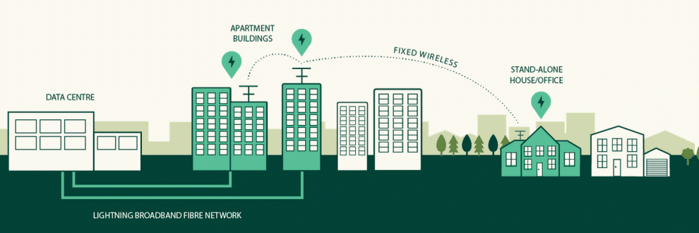What you need to know about fixed wireless internet
Fixed wireless internet technology has rapidly evolved in recent years. These days it’s as good, if not better than many other types of fixed line broadband services; yet some myths persist.
What is fixed wireless internet?
This form of internet service delivery involves a fibre-optic cable being run to a transmission tower (usually on top of a building) and the signal beamed from the tower to antennas on the rooftops of homes and businesses in a local area. It’s how Lightning Broadband delivers its residential services . If you’re curious about learning more, a detailed description of our hybrid fibre/wireless technology can be viewed here .
The difference between fixed wireless internet and mobile broadband
People often confuse fixed wireless internet with mobile broadband. Unlike mobile broadband that provides connectivity to any mobile user that is within range of one of their telecommunication provider’s towers, in a fixed wireless internet scenario, the signal is only broadcast to a particular set of customers within a confined area.
The customer’s equipment is (as the name suggests) fixed in place. However, using a wireless router, the customer is free to move about their home or business with mobile devices and still have internet connectivity.
Having such tight control as to how many customers are able to access a fixed wireless internet service results in fewer issues with competition for bandwidth. Mobile broadband networks can sometimes be overwhelmed if large number of subscribers are present in an area at a particular time, leading to services slowing to a crawl.
Generally speaking, fixed wireless internet services also offer faster speeds and more generous data allowances than are available on mobile broadband plans.
Busting fixed wireless broadband myths
Like many emerging internet technologies, fixed wireless internet could be a bit spotty in terms of speed, performance and reliability during its early days. What may have been true in 2013 certainly doesn’t apply today – the technology has evolved in leaps and bounds, evolving into a broadband technology that truly stacks up.
Super-fast
Lightning Broadband offers standard plans of up to 100Mbps (that’s upload rate as well as download speed) to our fixed wireless internet customers – which is comparable to top-tier super-fast NBN plans.
With higher frequency (24GHZ or 60GHZ) fixed wireless radios/antennas instead of our standard 5GHZ range, we can achieve incredible speeds of 1000mbps/1000mbps!
That kind of speed was something that until only relatively recently many thought would never be possible – and 5G fixed wireless broadband technology, while now mature, is still evolving.
Super-reliable
The fixed wireless internet of today is as reliable as wired connections and isn’t as heavily impacted by weather conditions such as heavy rain as it once was. While it is still important to have line of sight to the tower from your rooftop with as few physical obstructions as possible between to ensure the best quality service, obstructions these days aren’t quite as problematic as they once were.
Super-generous
Gone too are the stingy data caps often associated with fixed wireless internet plans – at Lightning Broadband , we offer unlimited data; enabling our customers to browse, create and communicate to their heart’s content.
Other advantages of fixed wireless internet
- As it is an “over the air” delivery, there are fewer logistical issues in terms of installation, such as having to dig up paths and roads to lay cables to each house.
- It doesn’t require transmission over old copper lines for the final run as some NBN services do.
- Rolling out fixed wireless broadband in an area can be much cheaper than doing so for wired connections.
- It’s less susceptible to subsequent damage through earthworks, water ingress and pests.
- Very low latency – latency is the measure of time delay from one point of a network to another. At around 5 milliseconds (0.005 seconds) for fixed wireless internet, this is far faster than satellite and better than Fibre To The Node (FTTN), ADSL and even some Fibre To The Building (FTTB) solutions where copper runs within a building exceed 100 meters.
We’re independent of the NBN
What some Australians may also consider a significant advantage of Lightning Broadband’s fixed wireless internet service compared to those offered by some other ISPs is that it is independent of the National Broadband Network – we have no association with NBN Co.
We run our own fibre to buildings that we install our own towers on. We acquire fibre backhaul bandwidth from leading tier-1 providers including Vocus, PIPE and AAPT at levels to ensure a speedy experience for all our customers – now and into the future.
Learn more about Lightning Broadband’s residential , commercial and developer broadband solutions.




